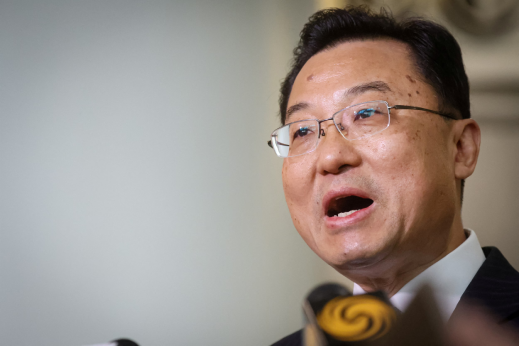China is extending cooperation with Pakistan in enhancing the use of nanotechnology in the agriculture sector, WealthPK reported on Sunday.
High-efficacy agriculture will be aided by nanotechnology, which will put conventional agriculture on the path to high-quality connotative development.
It can effectively support farmers’ increased output and income while also addressing issues such as abandoned farms and the negative consequences of pesticide and fertilizer overuse.
“We tend to extend this achievement to our iron-brother Pakistan,” Dr Wu Zhiguo, Director of Gansu Academy of Sciences’ Nano Application Technology Research Office, said in a video discussion with Prof Dr Muhammad Yaseen from the University of Agriculture Faisalabad (UAF).
The meeting was also attended by Ma Yutian, Executive Director General of the Gansu BRI Technology Transfer Center.
Nanotechnology has the potential to benefit the agriculture and food industries by developing revolutionary nanotools for disease management, nutrient absorption capacity, and other applications.
Specific applications such as nano fertilizers and nano pesticides to trail products and nutrient levels to increase productivity without decontaminating soils, waters, and protection against several insect pests and microbial diseases are among the significant interests of using nanotechnology in agriculture.
Dr Sajjad, Senior Scientific Officer at National Agriculture Research Council (NARC), told WealthPK that China Machinery Engineering Corporation (CMEC) is interested in establishing an agriculture, science, and technology transfer center in Pakistan to offer cooperation in agriculture mechanization for improvement of crop yield and seed quality.
“The center will be constructed on a government-to-government (G2G) aid basis at first, with an anticipated cost of $50 million. Chinese corporations with agricultural research and expertise are flocking to Pakistan to form joint ventures (JVs) with Pakistani farmers,” Sajjad said.
“The center will provide agricultural mechanization training to Pakistani farmers. There will be farmer demonstrations and training,” he added.
Zhengbang Group, a Chinese business, is building a factory at Pakistan’s M-3. The corporation expressed interest in forming a joint venture in Pakistan. The largest fertilizer firm in Pakistan, Fauji Fertilizer Company (FFC), and the Zhengbang Group have signed a memorandum of understanding (MoU) for a joint venture in feticides, cow and poultry feed, and cottage farming.
They’ll cooperate and work together,” he said, adding that the Chinese firm is also interested in soybean growing in Pakistan, which it plans to export.
“It will be a venture that focuses on exports.”
They intend to establish buffalo farms that are free of foot and mouth illness. Royal Group wants to start four huge farms with 8,000 animals and milk processing units with a $50 million investment, he said.
A senior officer said, “It will also provide value-added items like milk powder, cheese, and package milk.”
As a result of the nanotechnology for high-yield agriculture initiatives, not only will Pakistani farmers profit, but also China’s agricultural science and technology will have a new avenue to reach the rest of world.
China helps Pakistan to enhance nanotechnology use in agriculture sector





